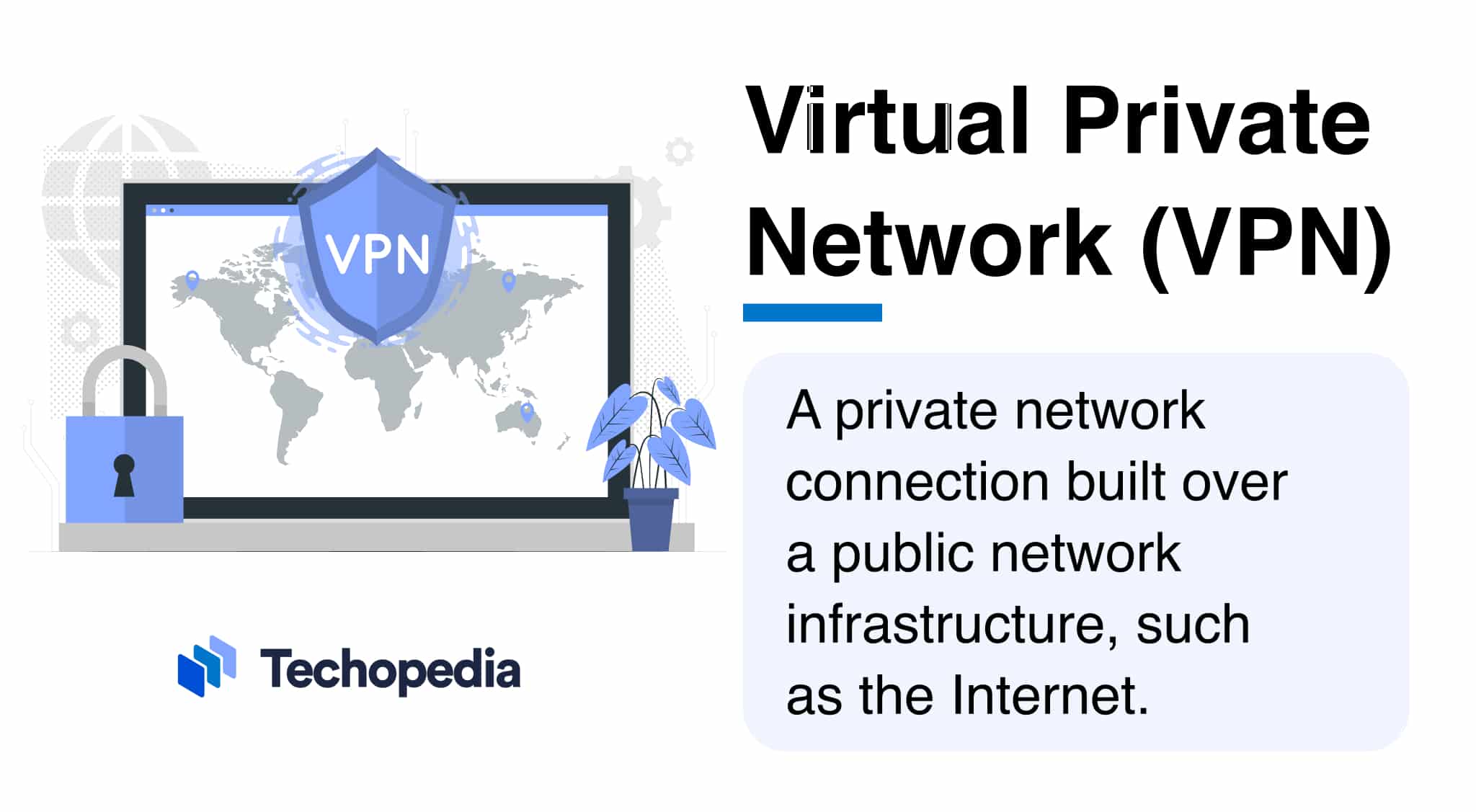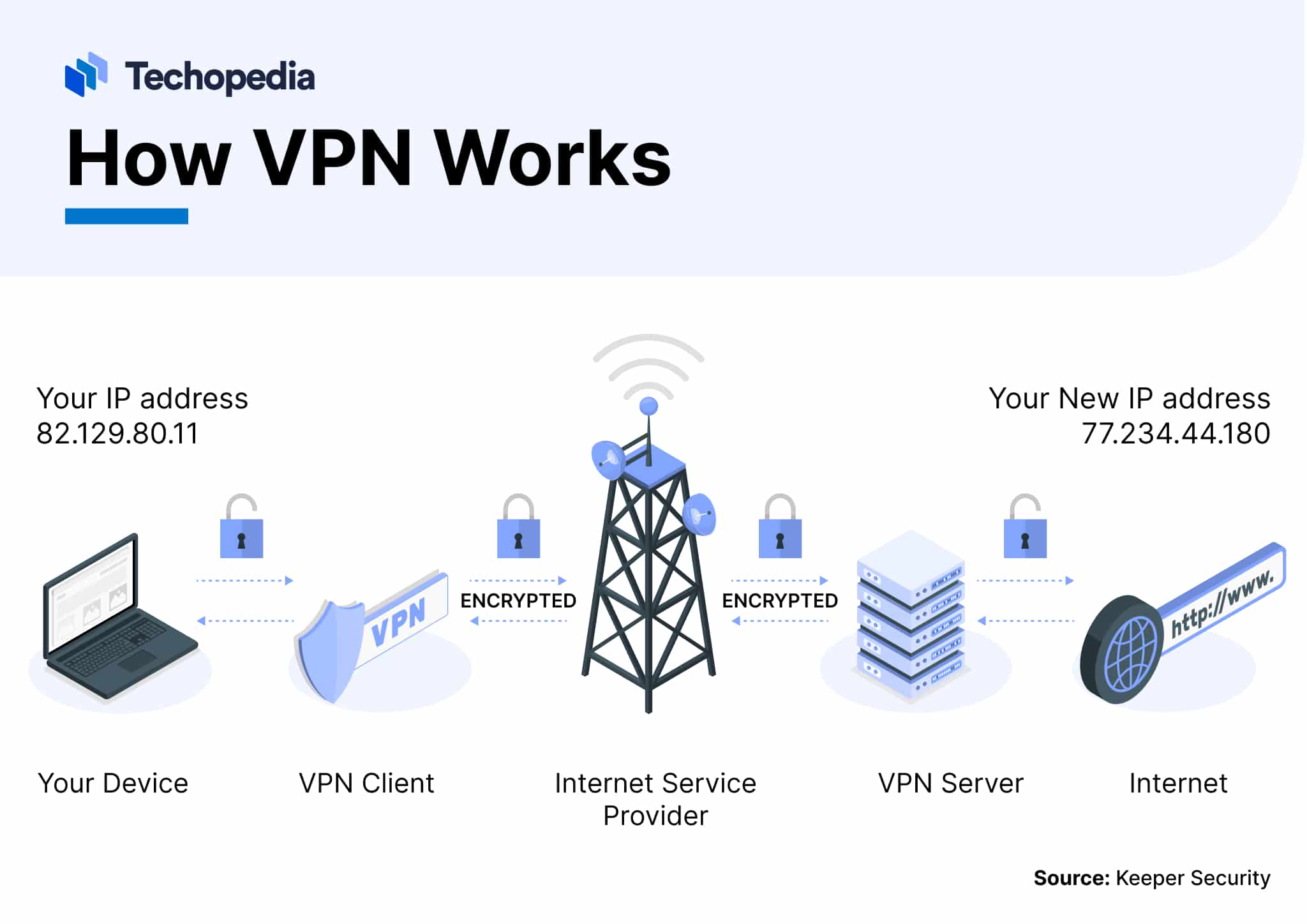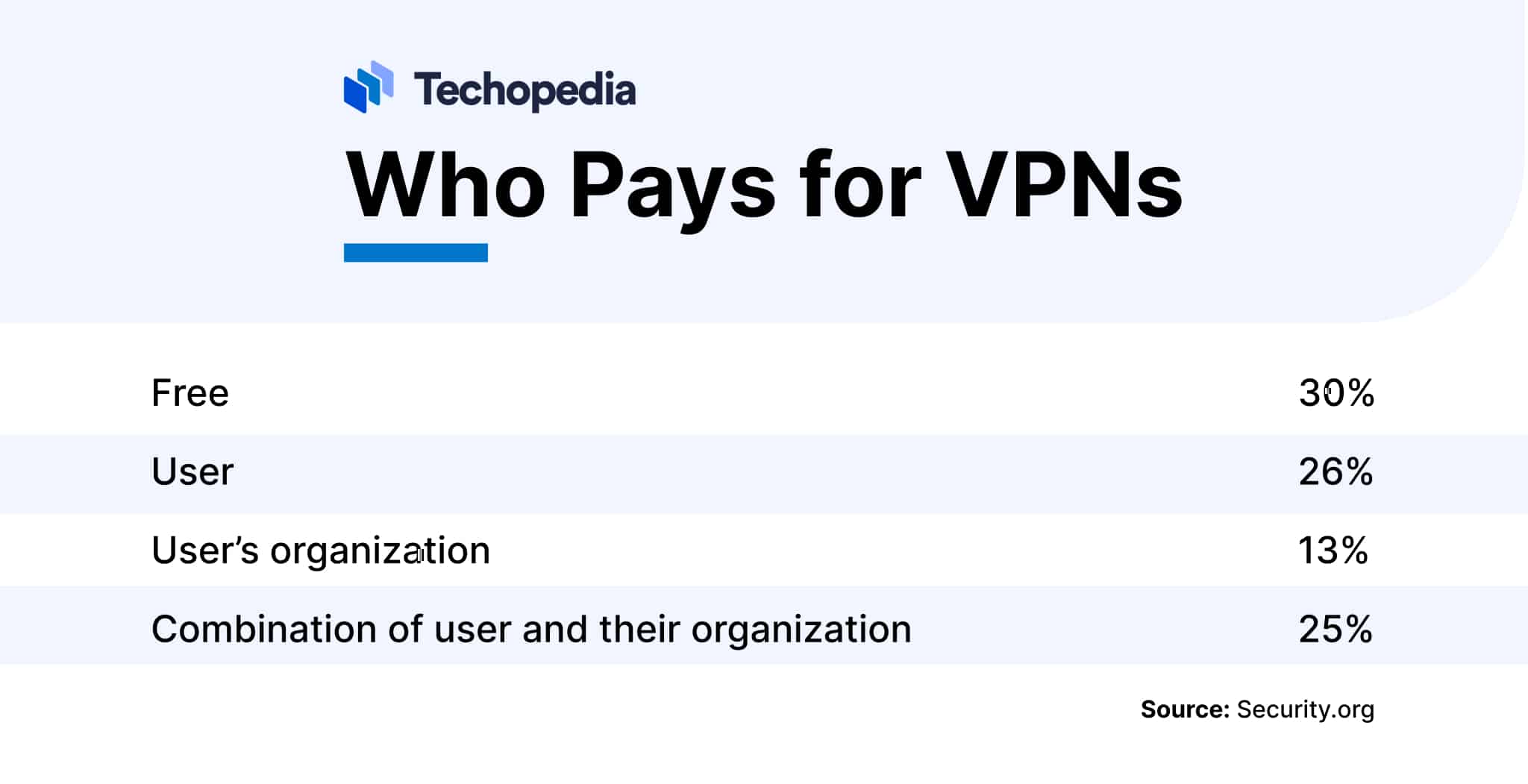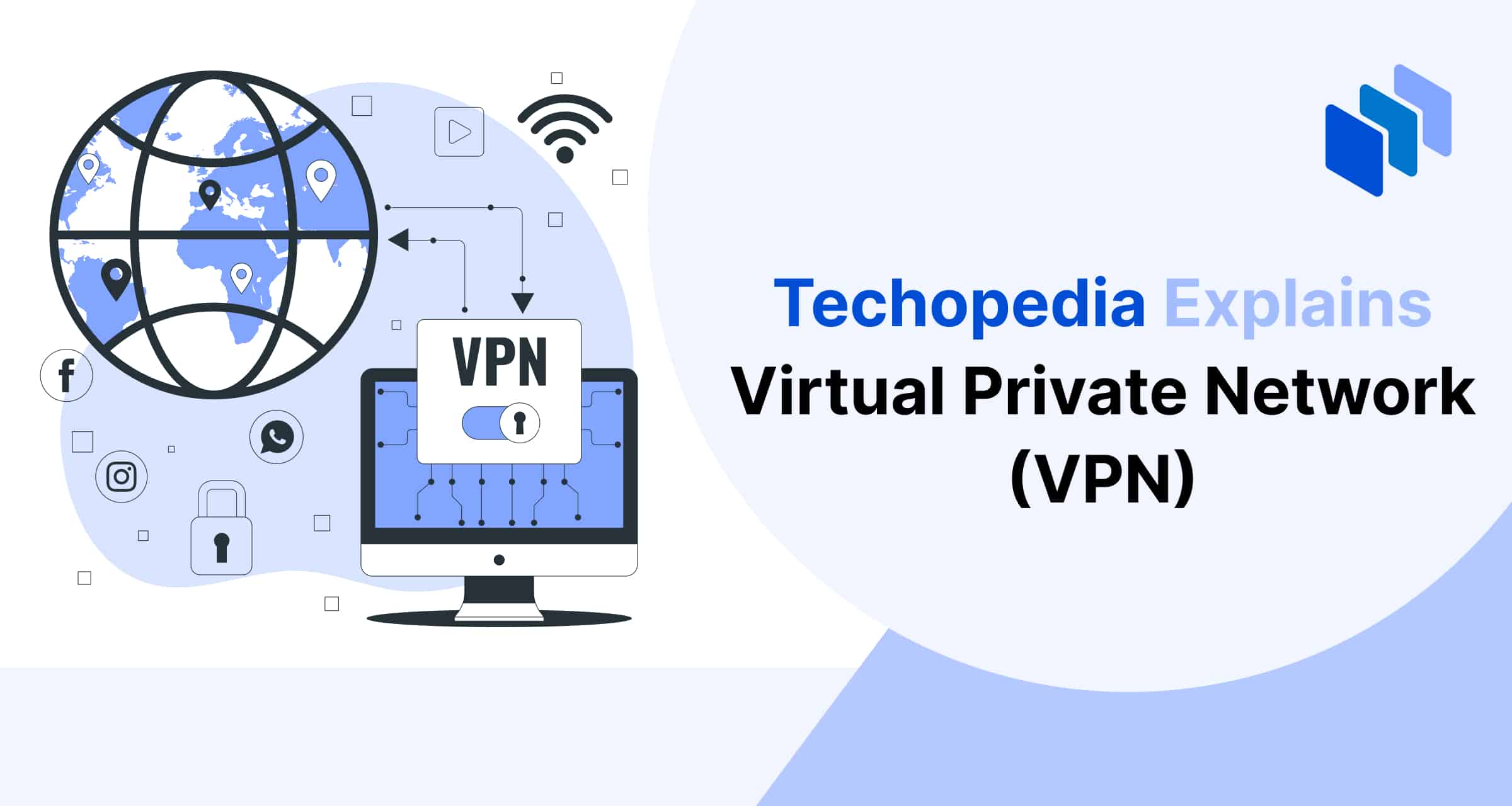What is Virtual Private Network (VPN)?
A virtual private network (VPN) is a private network connection built over a public network infrastructure, such as the Internet. What VPN means is that it provides users with a protected connection for safe Internet access. A VPN connection is commonly used for anonymous web browsing, encrypting Internet activity data, and securely transmitting files.
Key VPN characteristics are:
- Anonymity
- Authentication
- Encryption
- Logging policies
- Privacy
- Security
To create a secure connection VPN technologies include encryption, tunneling, IP masking, and other VPN protocols. User and device authentication mechanisms in VPN ensure that only authorized users or devices gain access. Methods range from username and password or multi-factor authentication (MFA) to digital certificates and biometric authentication.
Security mechanisms allow authorized VPN users to access corporate networks remotely or protect personal information on public Wi-Fi, such as airports.

Key Takeaways
- A VPN is a private network connection built over a public network, such as the Internet.
- It is used for anonymous web browsing, transferring files, and connecting to a corporate network.
- A VPN client encrypts the data and creates a secure connection (tunnel) between the user’s device and the VPN server.
- A VPN server decrypts the data and forwards it to the destination, masking the user’s IP address for anonymity.
- A site-to-site VPN is often used by businesses to connect networks from multiple branches.
- Show Full Guide
What Does a VPN Do?
A VPN improves security and safeguards an individual’s privacy on public networks by encrypting data transmissions and establishing a secure tunnel between the user’s device and the destination.
Examples include:
- Masks user’s IP address to conceal location
- Protects data from spying and tracking
- Secures connections on public Wi-Fi
How Does a VPN Work?

Here is how VPN works:
User/device
A connection is initiated from the user’s device to access the VPN.
VPN client
The VPN client encrypts the data and creates a secure connection – or VPN tunnel – between the device and VPN server.
Tunnel
The encrypted data is transmitted securely through the Internet service provider (ISP), preventing the ISP or any external third party from viewing the data.
VPN server
The VPN server decrypts the data and forwards it to the destination, masking the user’s IP address for anonymity.
Public network/Internet
The user can browse or access resources on a public or remote network.
How does a VPN network work on different devices? For the most part it works the same across different platforms.
Here is how a virtual private network service works on smartphones, with Wi-Fi, and for streaming:
VPN Security
VPNs provide a way for users to protect their online privacy or securely access their corporate network remotely. Security is delivered through networking and tunneling protocols – encrypting data when it is transmitted and then decrypting when it reaches the destination.
Do VPNs Protect Against Malware?
Some VPN services offer basic online security features, such as blocking ads and malicious links. They may also slow or stop certain malware by using secure ports.
However, VPNs are primarily designed for privacy and should not replace the use of anti-virus software and online security best practices.
Types of VPNs
There are numerous types of virtual private networks that can be used in personal, business, or corporate settings.
A third-party service used to connect securely to cloud-based resources. It allows a business to manage their cloud infrastructure remotely.
A remote access VPN is an app that is downloaded, installed, and managed by a third-party service provider. It allows users to securely connect to corporate storage and software assets.
A site-to-site VPN connects two or more networks securely over the Internet. Often used by businesses to connect networks from multiple locations or branches.
VPN Protocols
When defining the term virtual private network, VPN protocols are technical standards that control the security, encryption, and speed of the data transmission within a tunnel.
Examples include:
- Internet Key Exchange version 2 (IKEv2)
- Layer 2 Tunneling Protocol (L2TP)
- OpenVPN
- Point-to-Point Tunneling Protocol (PPTP)
- Secure Socket Tunneling Protocol (SSTP)
- WireGuard
Why Should I Use a VPN?
A VPN safeguards your privacy online, when browsing or using peer-to-peer (P2P) file sharing. It hides your browsing activity, location, and identity. With a VPN, your ISP, advertisers, or any third party, will see encrypted data and the connection to the VPN server – not the online activity.
Popular VPN Uses
Some of the most popular virtual private network usage examples include:
- Securing connections on public Wi-Fi networks
- Bypassing geo-restrictions to access regionally restricted content
- Securing remote access for employees to a company network
- Hiding a user’s IP address to mask online activities
Will a VPN Speed Up Internet Connection?
A VPN may slow down your internet connection because it routes data through the VPN server and encrypts it, which adds latency.
However, if an ISP intentionally slows down (or throttles) high-bandwidth activities like streaming or gaming, a VPN can hide this activity and prevent throttling.
VPN Pros and Cons
Pros
- Bypass geo-restrictions to access content
- Increase privacy by hiding IP address
- Protect personal information on public Wi-Fi
- Secure data with strong encryption
Cons
- Free VPNs may log user data
- Potential decrease in Internet speed
- Potential increase in latency
- Some services block VPN connections
Are VPNs Legal?
Using a VPN is legal in most countries, but not all. Individuals should check regional laws, as VPN usage may be regulated or prohibited, depending on location.
Other important considerations include how the VPN is used:
- Censorship: The legality of bypassing censorship with a VPN depends on the laws of the country.
- Malicious activities: Using VPNs to hide illegal activities, such as hacking, pirating, or doxing, remains unlawful.
- Streaming service policies: Many streaming platforms prohibit using VPNs to bypass geo-restrictions.
How Much Does a VPN Cost?
VPN pricing typically depends on factors such as number of connected devices, dedicated IPs, extra features, and length of the subscription. For basic individual accounts, VPN service prices can range from $2 to $30 or more per month.
In the meantime, according to a recent report by Security.org, 30% of VPN users access a free VPN service. However, when choosing a virtual private network service, it’s important to remember what a VPN’s primary purpose is – some free VPN vendors ask for permission to log activity, which essentially defeats the purpose of using one.

Read the VPN license agreement carefully before clicking “I agree” to ensure it is a reputable VPN app.
How to Choose a VPN
- Determine your needs (e.g., security, speed, streaming)
- Ensure compatibility with your devices and platforms
- Check for strong encryption and security protocols
- Consider the legal jurisdiction under which the VPN operates
- Review the logging and tracking policy of the VPN service
- Look for extra features like ad-blocking and malware protection
The Bottom Line
A virtual private network definition is a private connection built over a public network like the Internet. VPN explained in simple terms means that users gain secure, encrypted access to the web or corporate networks, protecting their privacy and securely transmitting files.
VPNs encrypt data, hide users’ IP addresses, and allow access to remote networks securely. Common uses include browsing anonymously, bypassing geo-restrictions, and securing data on public Wi-Fi. When choosing a provider, review the logging policy and ensure they offer strong security features and compatibility with all your devices.









